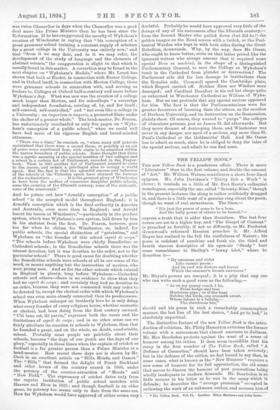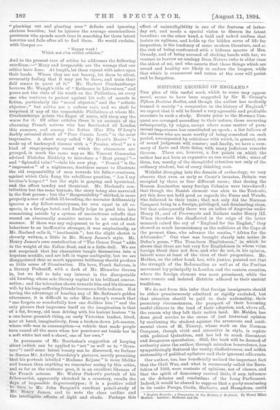THE YELLOW BOOK.* THE new Yellow Book is a ponderous
affair. There is more " Literature " than in the first volume, and double the amount of "Art." Mr. William Watson contributes a short four-lined epigram. Mr. John Davidson's "Thirty Bob a Week" is clever ; it reminds us a little of Mr. Bret Harte's colloquial monologues, especially the one called "Seventy-Nine," though in the present instance the slang is rather artificially dragged in, and there is a little want of a genuine ring about the poem, though no want of real earnestness. The lines,— " It's just the power of some to be a boss, And the belly power of others to be bossed,"— express a truth that is older than Socialism. The last four verses are set in a higher key, and "The Gospel of Content" is preached as forcibly, if not as diffusely, as Mr. Frederick Greenwood's reformed Russian preaches it. Mr. Alfred Hayes has realised to the full the restfulness of Nature ; his poem is redolent of sunshine and fresh air, the third and fourth stanzas descriptive of his open-air " Study " bear some resemblance to Shelley's "lawny islet," where he describes it- " By anemone and violet
Like mosaic paven And its roof was flowers and leaves Which the summer's breath enweaves."
Mr. Hayes's powers are unequal ; it is a pity that any one who can write such a good verse as the following,— " As on my grassy couch I lie,
From hedge and tree Musicians pipe ; or if the heat Subdue the birds, one crooneth sweet, Whose labour is a lullaby,— The slumbrous bee,"
should end his poem in such a remarkably commonplace manner, the last line of the last stanza, "And go to bed," is absolutely unpoetical.
The distinctive feature of the new Yellow Book is the intro- duction of criticism. Mr. Philip Hamerton criticises the former volume with a seriousness that almost amounts to dullness. Mr. Max Beerbohm protests against the want of a sense of humour among his critics. It does seem incredible that his essay in the first number of The Yellow Book, called "A Defence of Cosmetics," should have been taken seriously; but in the defence of the critics, we feel bound to say that, in some cases, what is known as the "New Humour" requires a new sense of humour for its full appreciation, the old sense that serves to discern the humour of past generations being wholly inadequate to modern demands. Mr. Beerbohm is as little serious in his letter as he was in the essay which it defends ; he describes the "average pressman" occupied in reviewing the work of an unknown author, and accuses him of The Yellow Book. Vol. IL London Elkin Mathews and John Lane. "plucking out and gloating over" defects and ignoring obvious beauties ; but he ignores the average conscientious pressman who spends much time in searching for those latent beauties and fails after all to find them. He would exclaim, with Cowper :— "Happy work ! Which not e'en critics criticise."
And to the present race of critics he addresses the following exordium :—" Many and irreparable are the wrongs that our critics have done. At length, let them repent with ashes upon their heads. Where they see not beauty, let them be silent, reverently feeling that it may yet he there, and train their dull senses in quest of it." Mr. Herbert Crackanthorpe borrows Mr. Waugh's title of "Reticence in Literature," and pours out the vials of his wrath on the Philistines, on every one who ventures to protest against his code of morals in fiction, particularly the "moral objector," and the "artistic objector ; " bat critics are a callous race, and we shall be surprised if any of the respectable Philistines at whom Mr. Crackanthorpe points the finger of scorn, will sleep any the worse for it. Of other articles there is an account of the charming French actress who has fascinated all London this summer, and among the fiction Miss Ella D'Arey's darkly coloured sketch of "Poor Cousin Louis" is the most impressive. A short story called "My Heart's Desire" is made up of hackneyed themes with a "Persian wheel" as a kind of stage-property round which the characters are grouped, in much the same way as Mr. Vincent °rummies advised Nicholas Nickleby to introduce a "Real pump and "Splendid tubs!"—into his new play. " Passed " is the " impression " of a nightmare, doubtless meant to illustrate the old responsibility of man towards his fellow-creatures, against which Cain flung his rebellious question, "Am I my brother's keeper ? " but the style is gasping and hysterical, and the effect tawdry and theatrical. Mr. Harland's con- tribution has the same keynote, the story being also narrated in the first person ; but the " Responsibility " shirked, is more properly a ease of selfish ill-breeding, the narrator deliberately ignores a shy fellow-countryman, his own equal in all re- spects, in a foreign hotel, and finally helps to goad him into committing suicide by a system of uncourteous rebuffs that wound an abnormally sensitive nature in an unlooked-for manner. If there was any enjoyment to be got out of such behaviour to an inoffensive stranger, it was emphatically, as Mr. Harland calls it, " heathenish "; but the slight sketch is cleverly written, a little in Mr. Henry James's style. Mr. Henry James's own contribution of "The Comm Trust" adds to the weight of the Yellow Book, and is a little dull. We are not surprised that his characters tangle themselves into a hopeless muddle, and are left in vague ambiguity, but we are disappointed that so much apparent brilliancy should produce so little sense of illumination. His hero, Frank Saltram, is a literary Pecksniff, with a dash of Mr. Micawber thrown in, but we fail to take any interest in the disreputable old humbug, whose sole literary capital is his brilliant conver- sation; and the toleration shown towards him and his tiresome wife by his long-suffering friends becomes a little tedious. Not having the advantage of hearing any of Mr. Saltram's golden utterances, it is difficult to echo Miss Anvoy's remark that "one forgets so wonderfully how one dislikes him !" and the only picture that impresses itself on the imagination is that of a fat, frowsy, old man driving with his lenient hostess "in a one-horse greenish thing, an early Victorian landau, hired, near at hand, imaginatively, from a broken-down job-master, whose wife was in consumption—a vehicle that made people turn round all the more when her pensioner sat beside her in a soft white hat and a shawl, one of her own."
In pursuance of Mr. Beerbohm's suggestion of keeping silent (which can be applied to "art" as well as to " litera- ture") until some latent beauty can be discerned, we forbear to discuss Mr. Aubrey Beardsley's pictures, merely premising that his portrait labelled "Madame Rdjane " is more lifelike and human than anything we remember seeing by this artist, and so far as the costume goes, it is an excellent likeness of the French actress. Mr. Walter Sickert's portrait of his fellow-artist, apparently sketched in a cemetery, recalls the days of impossible daguerreotypes ; it is a positive relief to turn to Mr. John Sargent's excellent pencil-study of Mr. Henry James, and to note the clear outline and the intelligible effects of light and shade. Perhaps this effect of unintelligibility is one of the features of latter- day art, and needs a special vision to discern its latent beauties ; on the other hand, a bald and naked realism that insists on ugliness, and holds up the hidden sores of life for inspection, is the tendency of some modern literature, and at the risk of being confronted with a hideous spectre of Mrs. Grundy, and of being accused of shaking hands with her, we venture to borrow an analogy from Nature (who is older than the oldest of us), and who asserts that those things which are sound and healthy are likely to endure the longest, while that which is evanescent and rotten at the (tore will perish and be forgotten.



































 Previous page
Previous page